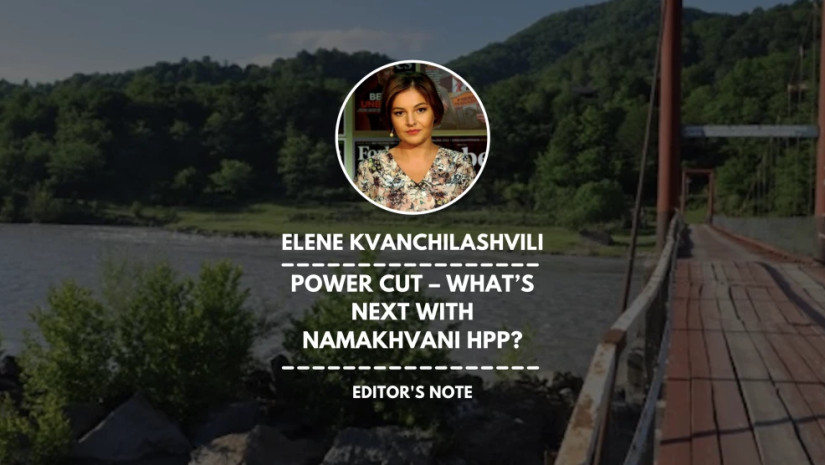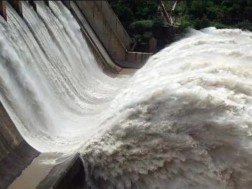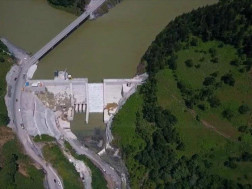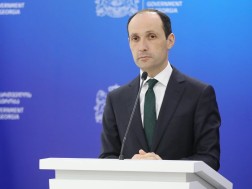ENKA terminated its agreement with the Government of Georgia followed by the constant protests against the HPP Cascade in the Rioni Gorge, citing environmental breaches and ‘cabal conditions’ of the contract with the investor. This time, it seems the Namakhvani HPP project has stopped for good and if in 1 month, the government and the investor do not come to terms on their own, the case may end up in an international arbitration dispute, most probably, worth millions.
PROJECT TERMINATION – QUOTES
Irakli Gharibashvili, PM: “Nobody knows how much we will have to pay. If the company leaves us, an independent auditing company will be involved in the case, which will estimate the number of its expenses and negotiate accordingly. It can be bought out by another company, there are many options, so I do not see a problem".
Rati Bregadze, Minister of Justice: “Ministry of Justice is responsible for the expertise of the agreement. None of the contracts are presented before the government for the approval without such expertise”.
Lasha Khutsishvili, Minister of Finance: “I hope that the period the company has taken to cancel the agreement will be enough to come to terms with the government. Better if the company continued to implement the project and end it within the deadline set by the contract. This project is very important and the Government of Georgia will do its best to have it completed on time”.
Natia Turnava, Minister of Economy: “Let us not run ahead. We have high hopes that we won’t end up in the arbitration process with ENKA and will try our best to come to terms with the investor via negotiations. The company itself has stated a number of times that they are investors and constructors and that their goal is to build the project not to run to the court. We will do our maximum to continue this project on mutually agreed terms”.
Varlam Goletiani, Head of the Resistance group against Namakhvani HPP: “ENKA has entered the Rioni Gorge on such cabal terms, that it will be impossible for the government to change them. So, ENKA must leave the Gorge unconditionally”.
ENKA: “Our company's 90% owned subsidiary, ENKA Renewables LLC has notified the State of Georgia to terminate the Build-Operate Agreement that had been signed with the Georgian State within the scope of the development, construction, ownership, and operation of the Namakhvani Cascade HPP Project in Georgia on April 25, 2019, for long-standing breaches of contract and force majeure”.
BLOW TO THE BUSINESS CLIMATE - QUOTES
Giorgi Chikovani, CEO, GEDF: “Everything should be done to avoid arbitration dispute with ENKA. We are not indulged with large-scale investments”.
Temur Chkonia, Businessman: “ENKA is the largest international company.
They are professionals. How come they’d pull together such a project that would tumble and sink Kutaisi? Negotiations might turn the project. However, the fact that we will be starting negotiations from below zero, makes it all more difficult”.
Murman Margvelashvili, Energy Expert, WEG: “Any company that is discontent with government decisions is entitled to arbitration. Arbitration courts exercise strict rules. To me, this dispute might cost Georgia around USD 1 billion, including non-returned investment and fines. This is a large blow to the energy security and the business climate”.
Levan Vepkhvadze, Executive Director, BAG: “For the last 2-3 months ENKA was getting ready for the arbitration – this was not a secret to anyone. Each morning the company representatives visited the entrance of the Gorge, documenting how members of the resistance movement did not allow them on site. The Government of Georgia should also be aware of this. We knew and many others knew. It was clear that the investor faced discomfort and was preparing documents to exit the agreement. This might become an additional problem for the state as solid reimbursements will hit the agenda”.
THE MAIN QUESTION
How did the story evolve so that instead of the step forward towards more energy security for Georgia, the country might end up in the arbitration dispute, raising questions about the soundness of its business climate for foreign investors and posing risks to the taxpayer money?
TIMELINE – HOW CHALLENGES ESCALATED INTO PROBLEMS
In 2019 the Government of Georgia granted the Istanbul-based engineering company ENKA and Norway’s Clean Energy Group the authorization to develop, construct, own and operate the Namakhvani HPP Cascade in the Imereti and Lechkhumi regions of Western Georgia.
The agreement “on Construction, Ownership and Operation” of Namakhvani HPP cascade was signed on April 25, 2019, between the Government of Georgia and the Government-owned companies (JSC Georgian Energy Development Fund, JSC Electricity Market Operator, JSC Georgian State Electro system) and the Clean Energy Group Georgia, the key investor in the project. The Clean Energy Group Georgia was later renamed ENKA Renewables after 90% of its shares were acquired by ENKA Insaat ve Sanayi A.S., a Turkish industrial conglomerate.
The main scope of the project was to build two separate HPPs on the Rioni River. According to the project, the Lower Namakhvani HPP should have generated 333 MW and the Upper Namakhvani HPP - 100 MW of electricity. The deadline for the construction was set for July 31, 2024. In May 2020, ENKA had already launched the preparatory works, working at four construction sites simultaneously. Total FDI accounted for USD 800 million and the company had also promised to employ a Georgian workforce – namely, up to 1,600 citizens - at the peak.
The project that seemed to have the potential to bring in money, expertise, employment, increased volumes of electricity, and energy security for the country gained more opponents than supporters. The main argument of the movement behind the resistance to Namakhvani HPP was that risks associated with building the Cascade had not been thoroughly identified and considered.
According to opponents, should the HPP be damaged ‘a 34-meter wave’ from the Namakhvani dam would ‘hit Kutaisi in 19 minutes, and the danger caused by the flood would ‘threaten the entire Kolkheti plains’; besides, the opponents feared that the change in the local microclimate would affect the micro-zones cultivating the grape varieties, including the famous semi-sweet white wine of Tvishi.
From January through June protests and clashes with the Police have become the main news regarding the Namakhvani HPP project.
In April, the Tskaltubo Magistrate Court found ENKA Renewables guilty of failing to comply with the terms set by environmental assessment and ecological expertise and issued a fine of GEL 5,000. On its part, ENKA Renewables stated that the company did not agree with the contents of the plea, yet it would not appeal the ruling in the higher instance of the court.
Late May marked a sizable rally in Tbilisi (following much larger protests in the regions) where the protesters reiterated their earlier demands of terminating the government’s contract with Namakhvani HPP investor and the ENKA Renewables company to leave the Rioni Gorge. They also called for launching criminal investigations against officials involved in drafting and signing the document, including Minister of Economy Natia Turnava. Besides, the protesters demanded to impose a moratorium on all similar projects until a coordinated energy policy was developed.
First, the Government of Georgia had the attempt to stand up to these demands. Georgian Prime Minister Irakli Gharibashvili and other officials dismissed them as ‘an ultimatum’, and maintained their position – that dialogue is necessary to better inform the activists on their concerns about the project – even though the activists kept repeating that the resources for this dialogue were exhausted.
Then a ‘classified’ letter composed by the Ministry of Justice came to light. It contained critical remarks on the Georgian Government’s agreement with the investor. The leaked four-page document, addressed at the Minister of Economy Natia Turnava and signed by then-Deputy Minister of Justice Mikheil Sarjveladze was dated March 30, 2019. It presented 22 critical remarks on the terms of the investor contract and allegedly, preceded the actual signing of the agreement.
According to the leaked document, the overall concern with the agreement was that the absolute majority of obligations applied to the Government of Georgia and affiliated companies, while the rights of the investor in the same contract were protected to the maximum, and its liabilities and obligations were limited. The Ministry recommended concluding the agreement pursuant to principles laid out in the Law of Georgia on Public-Private Partnerships (PPP).
The protesters focused their attention on the 99-year-long land lease condition – calling on their supporters to defend the Georgian soil from selling to Turks. The protesters warned several times that a mere change to this condition with say, a 49-year lease would not be seen as a solution to the problem.
In its defense the Ministry of Economy said Namakhvani HPP project was ‘one of the best-researched in Georgia’s energy sector, citing studies conducted by four consulting companies during 2007-2019 – World Bank, Gamma Consulting Company, McKinsey & Company, and global consulting company NERA - all ‘confirming the feasibility' of the project.
About a week later from this statement, Prime Minister Irakli Gharibashvili stated that the government was against continuing the Namakhvani HPP project under existing terms, including 99-year-long land possession, and use by the investor. The PM said they were currently in talks with the investor to persuade the company on new terms that would be in ‘the best interests of our people, including those against the Namakhvani HPP’. PM Gharibashvili stressed that he ‘inherited the problem,’ pointing at his predecessor Giorgi Gakharia.
Earlier than that the Government of Georgia announced that the HPP construction would be suspended for 9 to 12 months until the environmental, geological, and seismological surveys were reviewed and confirmed. According to the Government Administration, Turkish company ENKA Renewables would continue the infrastructural preparatory works only for the first stage per the valid construction permit. The Ministry of Justice would further hire an international legal company to study the contract’s compliance with the international norms and practices. And lastly, at the invitation of the government, a representative of the EU’s Energy Union would get involved in the mediation process with the non-governmental sector and study the environmental impact of Namakhvani HPP.
The mediation process failed. Anti-Namakhvani HPP group quit the mediation stating that ‘the mediator leans towards a formal and technical solution to the issue in which only the government side is interested’.
This being the last drop, ENKA terminated Namakhvani HPP contract with Georgia, citing the breaches of contract and force majeure.
The mediation process is still ongoing but without the participation of the direct sides.
WHAT COMES NEXT
This decision does not mean the Namakhvani HPP project is automatically canceled altogether. In theory, the Government of Georgia can still look for other investors to continue the construction. But we know this is less realistic taking into account that the resistance to the Namakhvani HPP cascade is just one example. There are a number of groups opposing the idea of hydropower development in the country – be it big or small.
Meanwhile, the contract says that the company and the Government of Georgia could choose to resolve the dispute via international arbitration in Paris. Before that, they may try to come to terms on their own.
One way out suggested by the contract is that if the company cancelled the contract at the stage of preparatory works it may request from the government to purchase the company’s assets. This is the case now, which means that the state (meaning us - taxpayers) may have to buy in hundreds of hectares of lands the investor had purchased for a symbolic price from the state, for market price.
This in its turn means we – the taxpayers – will have to pay for the badly managed process of building the Namakhvani HPP. And on top of that, we might not even get to know how much we paid out of our pockets since according to the contract, arbitration dispute and all its details must be kept confidential.
What can’t be kept secret is the fact that the business climate in this country just got another blow to its reputation. Again.
TRENDS TO KEEP IN MIND
USD 106.8 Million – this is the volume of Foreign Direct Investments in the Energy Sector in the first half of 2021. This number is 13 times more than the volume that Georgia received in the same period of the pandemic 2020; however, it falls short by 33% of the FDI in the sector in the first half of 2019. Overall, FDI in Georgia keeps its declining trend for four years in a row. Experts say problem in FDI statistics is not only the numbers but also the lack of new companies.
1.05 billion KWH – this is the volume of the electricity that Georgia imported from Russia in 8M21. This is the record volume imported from Russia so far. Overall, in 8M21, electricity imports have reached 1.71 billion KWH. This is 7% more than the electricity imported during the full 2020. In the last 10 years, Georgia has turned from the net exporter of electricity into a net importer.
















